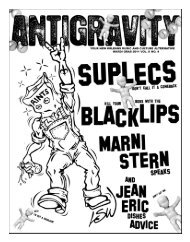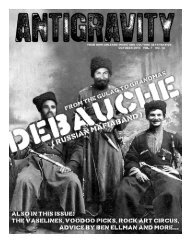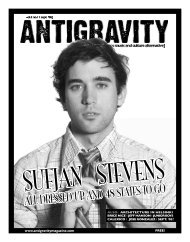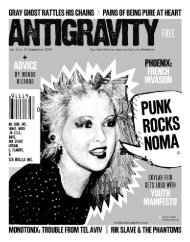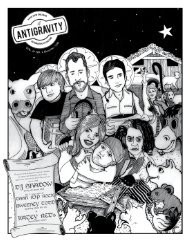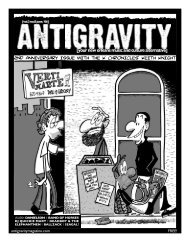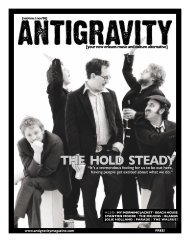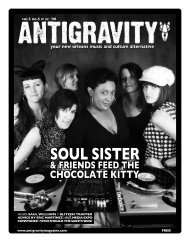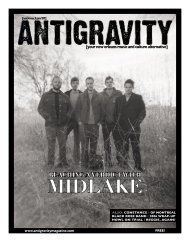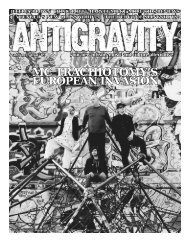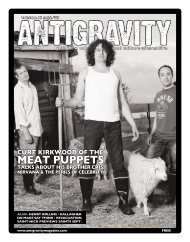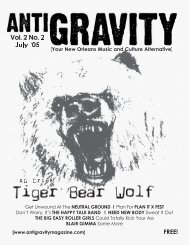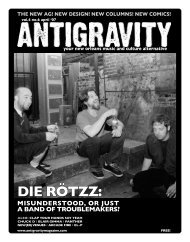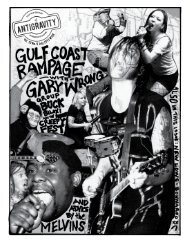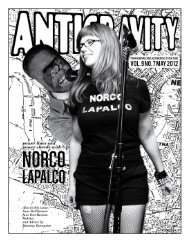September 2008 (PDF) - Antigravity Magazine
September 2008 (PDF) - Antigravity Magazine
September 2008 (PDF) - Antigravity Magazine
You also want an ePaper? Increase the reach of your titles
YUMPU automatically turns print PDFs into web optimized ePapers that Google loves.
FEATURE REVIEWMUSIC<br />
ANTIGRAVITY: You guys aren’t all from here.<br />
How did you end up in New Orleans playing music<br />
influenced by Zydeco?<br />
Christian Küffner: I guess it’s different stories for<br />
everyone. Our bass player is from Slidell. He’s the<br />
newest member of the band. I remember the first time<br />
I saw live Cajun music was a band called Mamou,<br />
on Bourbon Street. It was a long time ago. And they<br />
were really good, a bit of metal, of rock, punk. They<br />
never got beyond being a Bourbon street band, but<br />
they were really good and it was the first time I heard<br />
Cajun or Zydeco. That’s where that started.<br />
AG: How have the physical, historical, social<br />
worlds of New Orleans affected your music?<br />
CK: I think that would happen no matter where you<br />
live. But…<br />
AG: Yeah, I mean just the atmosphere of the city<br />
in general. Could Zydepunks be based anywhere?<br />
Could you guys be based out of New York or<br />
Chicago?<br />
CK: Yeah, but not in the same way. It would sound<br />
different.<br />
AG: How so?<br />
CK: That’s a tough question; I’d have to think about<br />
it. [Pause] It’s hard to nail that. I know we have a<br />
Louisianan sound to us. Regardless that we’re playing<br />
Cajun and Zydeco, there’s something in the way we<br />
sound that’s Louisiana. Maybe that there is no guitar?<br />
Yeah, maybe because people in New Orleans use a lot<br />
differently, be differently. You know, the Dubliners<br />
were around back where everyone in Dublin was<br />
working in factories and not for Microsoft. Same thing<br />
with the Balfa Brothers. They were farmers. But a lot<br />
of the Cajun bands now, they’re not farmers anymore.<br />
Some of them are, but not many.<br />
AG: So you think losing part of that culture affected<br />
the growth of the music?<br />
CK: Yeah, totally. A friend of mine moved to<br />
Portland, Oregon, and I didn’t realize it but Kevin<br />
Burke, who’s one of the most famous Irish fiddlers in<br />
the world, lives there and my friends that live there,<br />
the ones from Thibodaux, we talked about the fact<br />
that culture is pretty much dead compared to what<br />
it used to be. You can play Cajun music—we played<br />
a zydeco festival in Holland this summer and of all<br />
the bands we were the only Louisianan band. Which<br />
is ironic because we are the most untraditional band<br />
there, but they had bands from Germany, Denmark<br />
and England playing Louisiana music. Most Cajun<br />
and zydeco music is still from here but the whole idea<br />
that anybody can just pick a culture and run with it<br />
didn’t used to be. Now, people can do anything they<br />
want. Germany has a huge Irish punk scene.<br />
AG: Really?<br />
CK: Oh yeah. And Columbia, Argentina, Japan,<br />
they’ve got Irish punk bands. It’s totally defused. Like<br />
Flogging Molly—the last time they came through<br />
here they played with a Japanese Irish punk band. So,<br />
as a business strategy it makes sense—make sure<br />
your band is liquored up and well fed because they’ll<br />
play better. It is what it is. But, in a lot of venues<br />
you play—we played in a lot of small towns—were<br />
different because they don’t have music all the time,<br />
so they make a real effort to make an event out of it.<br />
In the cities it’s a less enthusiastic.<br />
AG: When you write lyrics in different languages,<br />
do you write in English first?<br />
CK: No, not at all. It’s weird because English is by<br />
far my strongest language but it’s easier to write in<br />
Spanish, actually, I don’t know why. It’s not my<br />
strongest language, but I think there’s less pressure if<br />
a lot of people can’t understand you. My Spanish just<br />
flows easier. Words are very phonetic and rhyme very<br />
differently in different languages, and in Spanish or<br />
French it’s a lot easier to rhyme because they have<br />
very common endings.<br />
AG: The first two albums were very multi-lingual,<br />
but Finisterre has only four songs that aren’t in<br />
English. Why did you go in that direction?<br />
CK: I don’t know. There’s not much in other languages<br />
on this album, and I was definitely aware of it. I think<br />
I felt more comfortable as a songwriter—period—to<br />
start writing in English. I felt like I just started writing<br />
better lyrics. Also, two of the songs were written by<br />
someone else. And he only speaks English.<br />
AG: You once said that a band has to evolve slowly.<br />
Is Finisterre your evolution?<br />
“We’ve moved away from doing as<br />
much traditional stuff—it feels like<br />
being in a cover band after a while.”<br />
of instruments that aren’t the standard instruments.<br />
AG: A sort of different question—would the<br />
Louisiana influence have come regardless or only if<br />
the band lived here?<br />
CK: You know, it probably would have. I tried to start<br />
a band like this in Philly. But it didn’t work out. So I<br />
said, “Fuck it, I’ll move [to New Orleans].”<br />
AG: Were the Philly people just not that into it?<br />
CK: I wasn’t there very long, and Northeasterners are<br />
a little harder of a nut to crack. And the people in the<br />
south…in the south, if you ask somebody something,<br />
they say, “Yeah, sounds like a good idea. Let’s do<br />
that!” In D.C. or Philly, people would say, “That<br />
sounds great, give me your number.” And they’d<br />
never call. You know, it’s just harder to meet people.<br />
AG: You list a lot of different influences, from the<br />
Balfa Brothers to the Clash to the Ukrainians. Is<br />
there anyone that you find influenced you the most,<br />
or that you like the best?<br />
CK: No. Not really. I mean, amongst certain genres,<br />
yeah. There’s a lot from the Abshires to the Balfa<br />
Brothers. I mean, there’s just a certain era of really<br />
good recordings. Because, you know the really old stuff<br />
that Alan Lomax got down on CD or tape was…it just<br />
didn’t have the same kind of refined sound as a band,<br />
the old kind of Cajun ballad stuff. It’s good, but once<br />
you hit a point where you have Canray Fontenot and<br />
Balfa Brothers, you have some really good recordings,<br />
but once people started taking rock and roll influences<br />
it really changed. So you only have a certain phase.<br />
Same with Irish music. You have the Clancy Brothers<br />
and the Dubliners and you have a certain phase where<br />
you have real music recorded and then after that you<br />
almost can’t recreate it anymore. People used to live<br />
yeah, you don’t have that anymore. Which is why I<br />
think I find those recordings so special.<br />
AG: Do you think it’s good to have things so<br />
defused?<br />
CK: It’s kind of strange. I mean, the world is changing<br />
so fast. I think because my parents are from the old<br />
world that I have a foot in that kind of mentality. I<br />
remember things being much more traditional when I<br />
was growing up. I’d visit Ecuador, where my mom’s<br />
from, and Ecuador now is just a completely different<br />
world. It was still halfway in the 1800s when I used<br />
to visit.<br />
AG: It’s westernized now?<br />
CK: Yeah, and the internet has changed everything.<br />
You know, people used to talk about albums there<br />
and stuff, but they would only get very limited access.<br />
Now with the internet they’re just as fast as Americans<br />
or Europeans to be at the forefront of things. So<br />
something that would happen in Europe could go to<br />
Ecuador sooner, or Tahiti for example. And that never<br />
used to be the case. It used to take, like, ten years for<br />
albums to get down there.<br />
AG: You just came back from touring in Europe.<br />
What are some of the differences between playing<br />
in Europe and in the states?<br />
CK: A lot. The distances are much shorter. That’s<br />
the first thing. Club owners and venues tend to be<br />
friendlier. They also tend to treat the band better.<br />
Everybody feeds you. Doesn’t matter if you’re in the<br />
country or the city.<br />
AG: That’s a nice perk.<br />
CK: It’s great and makes sense because there’s nothing<br />
worse than showing up to a club and you’re hungry<br />
and you’ve got to pay for your own food. You know,<br />
CK: We’ve moved away from doing as much<br />
traditional stuff—it feels like being in a cover band<br />
after a while. I like the old songs and, who knows, we<br />
might do more traditional stuff again because I think<br />
we’re tired of all the old ones we play. I’ve been playing<br />
a lot of them since before the band. I’ve been playing<br />
some of the same songs for twelve years. I don’t know<br />
what we’re going to do now because I’ve been writing<br />
a little bit, but I need like, a month. I need to lock<br />
myself in a closet and start writing. You don’t know<br />
where it goes. I know that I used to write all the time<br />
and I used to love this really heavy electronic stuff,<br />
but when I sat down to write it was ambient in the<br />
sense that I didn’t know what was going to come out.<br />
I never think exactly, “Okay, this is what I’m going to<br />
do.” I just start playing. I guess that’s how I write. I<br />
very, very rarely make a conscious effort to write.<br />
AG: Is that the same way with the music?<br />
CK: It’s the same as the lyrics. It’s just whatever starts<br />
coming out. It depends also on what I’ve been listening<br />
too. For this album I listened to a lot of music from<br />
France. And a lot of people don’t really know much<br />
about music from France, but this album has a lot of<br />
that sound. But it’s just kind of hard to explain. People<br />
know Irish, people know Cajun but people don’t know<br />
a lot of stuff from France.<br />
AG: I was going to ask what you guys liked about<br />
playing traditional music, but you just said you’re<br />
tired of it.<br />
CK: No, I’m not tired of it. It’s just that we’ve been<br />
playing some of the same things for ten years. I heard<br />
this horrible jackass on WWL radio talking about<br />
how he’d seen Rod Stewart and David Bowie. He<br />
said he loved Rod Stewart because he played old stuff<br />
antigravitymagazine.com_25



